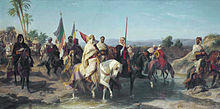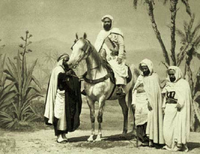Algerian popular resistance against French invasion
This article needs additional citations for verification. (December 2020) |
This article may be expanded with text translated from the corresponding article in Arabic. (December 2020) Click [show] for important translation instructions.
|
| Algerian popular resistance against French invasion | |||||
|---|---|---|---|---|---|
| Part of History of Algeria | |||||
 | |||||
| |||||
| Belligerents | |||||
|
|
| ||||
| Commanders and leaders | |||||
| Algerian people | French Army | ||||
The Algerian popular resistance against French invasion is the historic process that the Algerian people undertook to counter the invasion of French colonial troops on Algerian soil.[1][2]
French-Algerian War 1681–88[]
The French-Algerian War (1681-1688) was part of a wider campaign by France against the Barbary Pirates in the 1680s.[3]
French conquest of Algeria[]
The French conquest of Algeria took place between 1830 and 1903. In 1827, an argument between Hussein Dey, the ruler of the Deylik of Algiers, and the French consul escalated into a naval blockade, following which France invaded and quickly seized Algiers in 1830, and seized other coastal communities. Amid internal political strife in France, decisions were repeatedly taken to retain control of the territory, and additional military forces were brought in over the following years to quell resistance in the interior of the country.[4]
Mitidja resistance[]
When the Algerian capital fell to the French army on 7 June 1830, a new phase of modern Algerian history began, the period of French colonialism.[5]
This is because the fall of the Deylical rule led to a political vacuum and as a result, both political and military leaders appeared in the countryside of the Mitidja region and took upon themselves the task of confronting the French occupation.[6]
The was the first armed popular resistance of Algerians against the French presence, which was generalized throughout the country and continued until the beginning of the 20th century.[7]
Emir Abdelkader resistance[]
When Emir Abdelkader pledged allegiance to resisting the French occupation, the Algerians rushed to him from all sides with the aim of uniting the people and fighting the French occupiers.
And for that, he played the role of the military leader who resisted the French by the so-called , played the role of judge, resolving disputes between tribes, and playing the role of politician by joining the scattered ranks.[8]
Ahmed Bey Resistance[]
Ahmed Bey ben Mohamed Chérif also known as Ahmed Bey, were a Bey of Constantine who were vassal of the Dey (Maternal uncle protector in turkish called like that by janissaries) in Algiers also called Sultan (Sovreign) all 3 years he had to move for show his loyalty to the sovreign also giving him the taxes taken from his province, Ahmed Bey in 1830 also moved in Algiers for that and he attempted to resist the french invasion but the Agha Ibrahim not listening to his advices will lose and in 3 weeks Hussein Dey will surrender Algiers to France, Ahmed Bey from 1830 until 1837 will resist from his capital Constantine and until 1848 in the Aures tribal warriors area where he will attempt to make resistance but he will be captured close to Setif.
Kabylia resistance[]
As soon as ended in defeat in 1847, Kabylia continued the until 1857 when Larbaâ Nath Irathen fell under French control.[9]
Mokrani Revolt[]
The Mokrani Revolt, which broke out on 16 March 1871, was the most important local uprising against French colonial power in Algeria since the conquest in 1830 : more than 250 tribes rose up, around a third of the population of the country. It was led by the Kabyles of the Biban mountains commanded by Cheikh Mokrani and his brother , as well as , head of the Rahmaniyya religious fraternity.
French Algeria[]
French Algeria was the colonial rule of France over Algeria since the pacification in 1871. French rule in the region began in 1830 with the invasion of Algiers and lasted until the Algerian War of Independence concluded in 1962. While the administration of Algeria changed significantly over the 132 years of French rule, the Mediterranean coastal region of Algeria, housing the vast majority of its population, was administered as an integral part of France from 1848 until independence.[10]
Algerian nationalism[]
Algerian nationalism has been shaped by Algerian-French dichotomies; tensions between the French and Algerian language and culture. It was inspired by people such as Ben Badis and Djamila Bouhired, who were two of the many opposing French colonial rule in Algeria.[11]
Movement for the Triumph of Democratic Liberties[]
The Movement for the Triumph of Democratic Liberties was created in October 1946 to replace the outlawed Parti du Peuple Algerien while Messali Hadj remained as its president.
Special Organisation[]
The Special Organisation was a secret paramilitary organisation in colonial Algeria, founded by Mohamed Belouizdad of the Movement for the Triumph of Democratic Liberties in 1947 to prepare for armed struggle against France, which ruled Algeria as a colony since 1830.
Algerian Revolution[]
The Algerian War was fought between France and the Algerian National Liberation Front from 1954 to 1962, which led to Algeria winning its independence from France. An important decolonization war, it was a complex conflict characterized by guerrilla warfare and the use of torture.[12]
See also[]
References[]
- ^ Meynier, Gilbert. L'Emir Khaled, premier za'iM ? Identité algérienne et colonialisme français. ISBN 9782296402041.
- ^ Tailliart, Charles (1999). L'Algérie dans la littérature française. ISBN 9782051017039.
- ^ Hugo, Abel (1843). "France historique et monumentale: Histoire générale de France depuis les temps les plus reculés jusqu'a nos jours".
- ^ Nettement, Alfred (1870). "Histoire de la conquête de l'Algérie: écrite sur des documents inédits et authentiques".
- ^ "Annuaire historique universel, pour ... Par C. L. Lesur. - 1819-1830; n. S. 1831-1839". 1837.
- ^ "Conquête d'Alger ou pièces sur la conquête d'Alger et sur l'Algérie". 1832.
- ^ Gaffarel, Paul (2004). L' Algérie: Histoire, conquête et colonisation. ISBN 9782906431751.
- ^ Rousset, Camille (1887). "Les commencements d'une conquête: l'Algérie de 1830 à 1840".
- ^ Rousset, Camille (1889). "La conquête d'Alger: 1841-1857".
- ^ Gaffarel, Paul (1892). "La conquête de l'Afrique".
- ^ Cappot, Jean-Gabriel (1856). "L'Algerie française".
- ^ Fabre, Thierry (2004). Colonialisme et postcolonialisme en Méditerranée: Rencontres d'Averroès # 10. ISBN 9782863641286.
- Algeria
- Battles involving Algeria
- Battles involving France
- French colonial empire
- Battles involving Ottoman Algeria
- Barbary pirates
- History of Algiers
- Imperialism
- French Algeria
- Sieges involving France
- Sieges involving the Ottoman Empire
- Invasions by France
- 19th century in Algiers
- Invasions of the Ottoman Empire
- Algerian War
- Rebellions in Africa
- Separatism in Algeria
- Wars involving the states and peoples of Africa
- Wars of independence
- African resistance to colonialism




